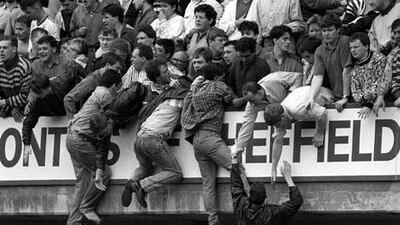The broadcasts coming out of Port Said Stadium in northern Egypt on Wednesday night were more akin to a bloody war than a showcase of the supposed Beautiful Game.
As fires burned in the background, spectators of Al Masry and Al Ahly stormed the pitch, chasing players and beating and stabbing their rival fans.
With 74 people dead and roughly 1,000 others believed to be injured, the horrific scenes are without doubt Egypt's most deadly football violence. Sepp Blatter, the Fifa president, called it "a black day for football" adding that "such a catastrophic situation is unimaginable and should not happen".
And yet the 18,000-capacity stadium in Port Said is not the first football arena to become, overnight, synonymous with death.
The Heysel Stadium in Brussels, Belgium, became the focus of the world on May 29, 1985 when it hosted the European Cup final, but the arena is not remembered for the result of the match between Juventus and Liverpool, but rather the disaster that resulted in the death of 39 spectators.
Although a thorough investigation has never been carried out, the general facts are largely uncontested. Uefa, European football's governing body, selected a stadium in such need of repair that fans on the night were able to kick holes in the exterior wall and gain access to the stands. Block Z, near to the predominantly Liverpool end of the stadium and denoted as a "neutral" area, was filled with Italian immigrants and local Belgians.
Roughly an hour before kick-off, Liverpool fans breached a chicken-wire fence and evaded inexperienced security guards to access Block Z. The "neutral" fans – the majority of whom were supporting Juventus – fled backwards until they reached a retaining wall, which collapsed, resulting in the majority of the 39 lost lives.
Fighting continued afterwards in what Lars-Christer Olsson, Uefa's former chief executive, described 20 years later as "the darkest hour of Uefa competitions".
The match, despite calls for abandonment, went ahead as officials said postponement could lead to further violence.
Michel Platini, who would go on to become the president of Uefa, scored the only goal of the game – a penalty – to give Juventus the win.
But Liverpool's unwelcome dalliance with tragedy did not end at Heysel. Four years later, with English teams still banned from European competition as a result of the violence in Belgium, the Merseyside club faced Nottingham Forest in the FA Cup semi-finals at Hillsborough Stadium in Sheffield.
It was April 15, 1989 and it will be remembered as the day 96 Liverpool fans died and 766 were injured as a result of a human crush caused by overcrowded terracing and incompetent policing.
Suffocating crushes and mindless violence at football stadiums are not prevalent, but such scenes have proved more common, especially in Africa, than anybody should wish.
Blatter, who was appointed head of world football's governing body in 1998 and took the World Cup to South Africa in 2010, said fatal incidents in the sport should not happen and yet this week's events at Port Said mean since the turn of the 21st century, more than 250 people have died in five separate incidents on the continent, including three tragedies in the space of one month in 2001.
Ten years after 42 people died in a 1991 stampede at a match between Kaizer Chiefs and Orlando Pirates, the two teams met again, this time at Ellis Park. Another 43 people were killed as fans tried to gain access to the sold-out stadium.
Less than four weeks later – and soon after seven people had died in a stampede in the Democratic Republic of Congo – 126 people were killed in the Ghanaian capital of Accra when police fired tear gas into the crowd during a game between the country's two leading teams, Hearts of Oak and rivals Asante Kotoko. The incidents in Africa put the spotlight firmly on stadium security and safety ahead of the 2010 World Cup prompting arenas in South Africa to be heavily renovated.
Port Said has now inherited the limelight. The hope is that if any good can come from the "black day" that Blatter spoke of, it will be a cue to implement wholesale changes to the way the game is followed in Africa.
Follow
The National Sport
on
& Gary Meenaghan on

